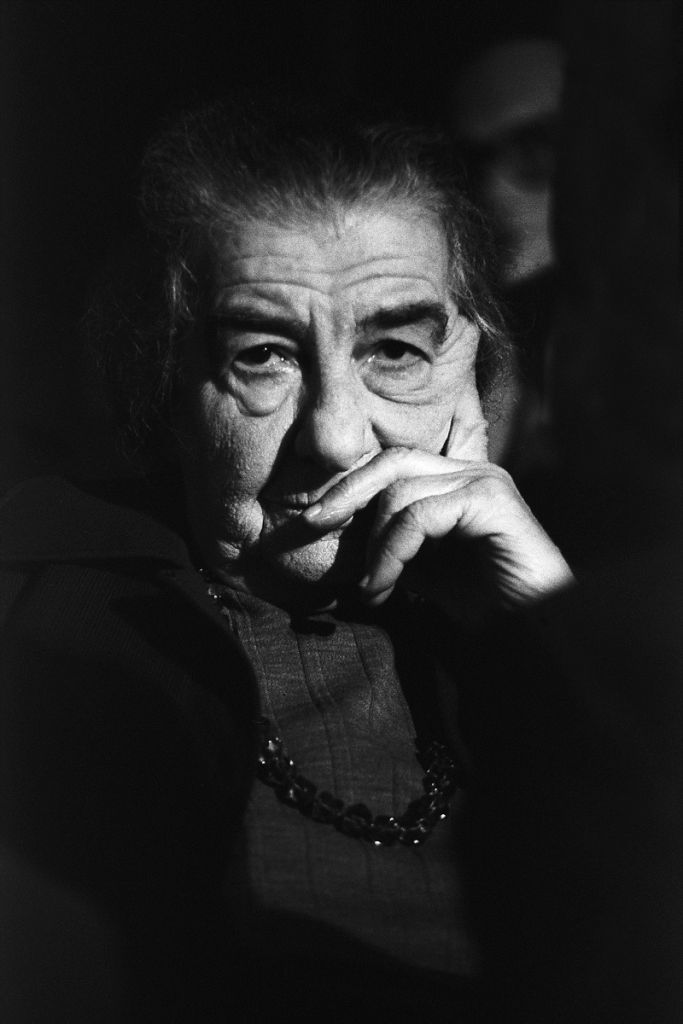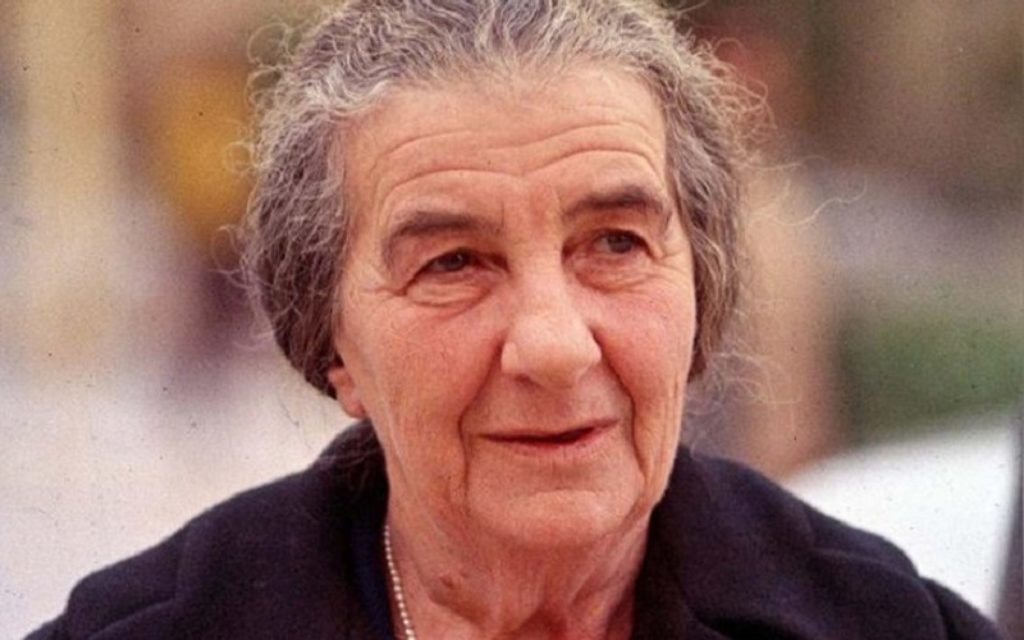Golda Meir: The first lady of Israel
On what would have been her 120th birthday, the role of Israel's first female prime minister in founding the Jewish state is detailed in this extract from Elinor Burkett's riveting biography, published for the first time in paperback
She was jestingly described by Prime Minister David Ben-Gurion as “the best man in government”, but Golda Meir was a true trailblazer, being present at the founding of the Jewish state and later in her career, becoming Israel’s first and only woman to hold the premiership.
To coincide with Israel’s 70th anniversary, Elinor Burkett’s deeply researched biography is published for the first time in paperback and traces Golda’s life from Russian persecution to her incredible influence in the political arena.
In this extract, Burkett explores Golda’s involvement in the events leading up to the founding of the state of Israel, on May 14, 1948.
Get The Jewish News Daily Edition by email and never miss our top stories Free Sign Up
“They made an odd pair, the sixty-year-old Hashemite king born in Saudi Arabia and the forty-nine-year-old Jewish woman from Pinsk meeting secretly to negotiate the future of a country to which neither held a birthright.
But the labyrinthine diplomatic wrangling sparked by the British decision to refer the Palestine question to the United Nations had generated dozens of bizarre alliances and odd bedfellows as it degenerated into a series of petty public squabbles and backroom deals over the United Nations Special Committee on Palestine, UNSCOP, charged with issuing recommendations for the fifty-five-nation General Assembly to consider in the fall of 1947.
By the time Golda snuck across the border into Naharayim, Transjordan, to meet King Abdullah, the General Assembly was ready to consider the committee’s proposal for political partition, with Jerusalem as an international city.
At a press conference, Golda had been asked if she thought blood would be spilled if that recommendation were adopted. “We don’t anticipate spilled blood, but we are ready if it happens,” she said, knowing full well that the tiny yishuv could not hold off a concerted attack by the armies of all the Arab countries threatening invasion.
Listen to the Jewish Views Podcast:
The only hope was that Abdullah would not send his Arab Legion—15,000 men trained and led by British officers—across his borders and that he would deny other Arab armies easy access to them…
Golda had almost no experience dealing with Arabs and none whatsoever negotiating with monarchs. But Sharett, Zionism’s leading diplomat, was stuck in New York leading the lobbying effort at the United Nations, and one of the yishuv’s leaders needed to meet with the king. So at the end of November 1947, she slipped across the border and waited for the king to arrive, as planned, at the compound of the Palestine Electric Cor-poration.
King Abdullah had been told that he would be meeting with the second most important Zionist diplomat, but the last person he expected was Golda, or any other woman…
…He shared thick Arab coffee with his guest and invited her to visit him at his palace in Amman—at some unspecified time in the future, of course. Then he launched into a soliloquy about partition and his recent discussions with the Arab League Council, reporting that he had told them that he would not collaborate in the destruction of a Jewish state.
“Over the past thirty years you have grown and strengthened yourselves and your achievements are many,” he told Golda. “It is impossible to ignore you, and it is a duty to compromise with you. . . . Any clash between us will be to our own disadvantage. . . . I agree to partition that will not shame me before the Arab world.”

That was sweet music to Golda’s ears, although Abdullah then returned to a suggestion he’d been making for decades, that he annex all of Palestine and allow the Jews their own republic within it.
Brushing off that notion, Golda tried to lead the conversation around to the partition resolution about to go to the United Nations…
“But I want this area for myself,” he huffed. “I want to ride, not to be ridden”…
Golda was taken with the king, “a small, very poised man with great charm,” in her words. But it was impossible to know how far to trust him. Not far, Ezra Danin, one of Golda’s two translators, suggested, cautioning her that Abdullah was notoriously unreliable and that Bedouins had their own concept of the truth.
***
The British Mandate was due to expire at midnight on May 14, but the yishuv leadership was still feuding about whether they should delay their declaration of independence….
“We need to go all the way,” insisted Golda, who had no vote but never allowed herself to be deprived of a voice. “We can’t do a zigzag. . . . The world is waiting for our announcement. It we don’t make it now, we never will.”
With 60 hours until the scheduled declaration, six of the ten cabinet members present swung in Golda’s direction…
The declaration of statehood ceremony was organized as a secret event lest the British try to prevent the creation of a Jewish government before their Mandate expired the following day. Only on the morning of the fourteenth, the day scheduled for the declaration, were the invitations delivered, by hand, urging the guests to arrive promptly at 3:30 and dress in “dark festive attire.”…
… As Golda made her way up Rothschild Boulevard into the Tel Aviv Art Museum, hundreds of people were already gathered outside, thousands more tuned in to Kol Yisrael for the station’s first live broadcast. The hall was packed with men and women from the Jewish Agency and the World Zionist Organization, the leaders of political parties, cultural and religious institutions, and the international press.
Golda took her seat with the other members of the National Council beneath a massive portrait of Theodor Herzl. At 4 p.m., Ben Gurion, dressed for once in a suit and tie, rapped his gavel. The Philharmonic Orchestra, hidden on an upper floor since there was no room for them below, poised to play “Hatikvah,” the new national anthem. But the crowd beat them to the punch, spontaneously bursting into song…

Ben-Gurion laid down the principles of freedom, justice, peace, and equal social and political rights that were to guide the new state, concluding, “With trust in the Rock of Israel, we set our hand to this declaration, at this session of the Provisional State Council, on the soil of the home-land, in the city of Tel Aviv, on this Sabbath eve, the fifth of Iyar, 5708, the14th of May, 1948.”
One by one, the signers of the declaration solemnly walked to the desk where Sharett held out the temporary parchment. Ben- Gurion had pleaded with the thirty-seven signers to adopt Hebrew names before the ceremony, and many had complied. Golda had not. Her hands shaking, tears streaming down her face, Golda signed Golda Meyerson.
“From my childhood in America, I learned about the Declaration of Independence and the geniuses who signed it,” she said. “I couldn’t imagine these were real people doing something real. And here I am signing it, actually signing a Declaration of Independence. I didn’t think it was due me, that I, Goldie Mabovitch Meyerson, deserved it, that I had lived to see the day. My hands shook. We had done it. We had brought the Jewish people into existence.”
Golda Meir: The Birth of Israel by Elinor Burkett is published by Gibson Square Publishers, priced £11.99 (paperback). Available from hive.co.uk

Thank you for helping to make Jewish News the leading source of news and opinion for the UK Jewish community. Today we're asking for your invaluable help to continue putting our community first in everything we do.
For as little as £5 a month you can help sustain the vital work we do in celebrating and standing up for Jewish life in Britain.
Jewish News holds our community together and keeps us connected. Like a synagogue, it’s where people turn to feel part of something bigger. It also proudly shows the rest of Britain the vibrancy and rich culture of modern Jewish life.
You can make a quick and easy one-off or monthly contribution of £5, £10, £20 or any other sum you’re comfortable with.
100% of your donation will help us continue celebrating our community, in all its dynamic diversity...
Engaging
Being a community platform means so much more than producing a newspaper and website. One of our proudest roles is media partnering with our invaluable charities to amplify the outstanding work they do to help us all.
Celebrating
There’s no shortage of oys in the world but Jewish News takes every opportunity to celebrate the joys too, through projects like Night of Heroes, 40 Under 40 and other compelling countdowns that make the community kvell with pride.
Pioneering
In the first collaboration between media outlets from different faiths, Jewish News worked with British Muslim TV and Church Times to produce a list of young activists leading the way on interfaith understanding.
Campaigning
Royal Mail issued a stamp honouring Holocaust hero Sir Nicholas Winton after a Jewish News campaign attracted more than 100,000 backers. Jewish Newsalso produces special editions of the paper highlighting pressing issues including mental health and Holocaust remembrance.
Easy access
In an age when news is readily accessible, Jewish News provides high-quality content free online and offline, removing any financial barriers to connecting people.
Voice of our community to wider society
The Jewish News team regularly appears on TV, radio and on the pages of the national press to comment on stories about the Jewish community. Easy access to the paper on the streets of London also means Jewish News provides an invaluable window into the community for the country at large.
We hope you agree all this is worth preserving.
-
By Laurent Vaughan - Senior Associate (Bishop & Sewell Solicitors)
-
By Laurent Vaughan - Senior Associate (Bishop & Sewell Solicitors)
-
By Laurent Vaughan - Senior Associate (Bishop & Sewell Solicitors)
-
By Laurent Vaughan - Senior Associate (Bishop & Sewell Solicitors)






















